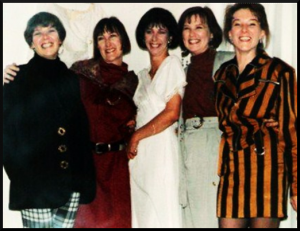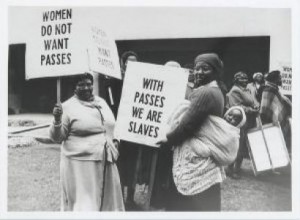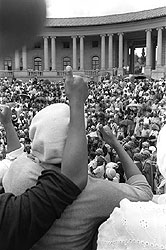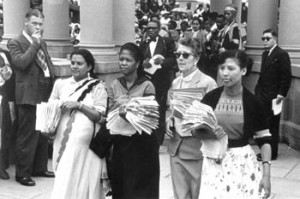In South Africa the 9th August every year is a public holiday which marks Women’s Day. This is not to be confused with the International Women’s Day on the 8th March, though. I wonder if women anywhere really need a holiday commemorating … what, them?
 The South African Women’s Day is grounded in our apartheid history of the 1950’s when the government’s tyrannical policies began to pose a direct threat to all people of color and created mass political action by blacks in defiant response. Women were prominent in virtually all avenues of protest but the anti-pass campaign began South Africa’s Women’s Day celebrations.
The South African Women’s Day is grounded in our apartheid history of the 1950’s when the government’s tyrannical policies began to pose a direct threat to all people of color and created mass political action by blacks in defiant response. Women were prominent in virtually all avenues of protest but the anti-pass campaign began South Africa’s Women’s Day celebrations.
The apartheid government’s influx control measures (not influx into the country, but into white areas) were cemented in pass laws which were what women reacted most vehemently to. In 1952 the Native Laws Amendment Act tightened this control by making it an offence for any African to be in any urban area for more than 72 hours unless in possession of the necessary documentation. That year the Natives Abolition of Passes  and Coordination of Documents Act were passed. In terms of this act the numerous documents African men had been required to carry were replaced by a single one – the reference book – (or Dompas) which gave details of the holder’s identity, employment, place of legal residence, payment of taxes and, if applicable, permission to be in the urban areas. The act further stipulated that in the near future African women would be required to carry reference books, too. Women were enraged by this direct threat to their freedom of movement and their anti-pass campaign was one of the most effective protest campaigns of any at the time. Remember that in those days our mines were flourishing where most black men in Johannesburg were employed and most white homes employed gardeners and at least one maid.
and Coordination of Documents Act were passed. In terms of this act the numerous documents African men had been required to carry were replaced by a single one – the reference book – (or Dompas) which gave details of the holder’s identity, employment, place of legal residence, payment of taxes and, if applicable, permission to be in the urban areas. The act further stipulated that in the near future African women would be required to carry reference books, too. Women were enraged by this direct threat to their freedom of movement and their anti-pass campaign was one of the most effective protest campaigns of any at the time. Remember that in those days our mines were flourishing where most black men in Johannesburg were employed and most white homes employed gardeners and at least one maid.
By the middle of 1956 plans were made for the Pretoria march and the FSAW (Federation of South African Women) had written to request that the prime minister, JG Strijdom meet with their leaders. The request was refused. They then sent Helen Joseph and Bertha Mashaba, Robert Resha of the ANC and Norman Levy of the Congress of Democrats (COD) to the main urban areas to consult with local leaders who would make arrangements to send delegates to the march in September.
 The Women’s March was an enormous success. Women from all parts of the country arrived in Pretoria, some from as far as Cape Town and Port Elizabeth. They marched to the Union Buildings in a determined but orderly manner. Estimates of the number of women delegates ranged from 10 000 to 20 000, with FSAW claiming that it was the biggest demonstration ever held. They filled the entire garden in the bowl of the graceful Herbert Baker building. According to history many of the African women wore traditional dress, others wore the ANC colors, green, black and gold and Indian women were clothed in white saris. Many women had babies on their backs and some domestic workers brought their white employers’ children along with them. Throughout the demonstration the huge crowd displayed a discipline and dignity that was deeply impressive. Neither JG Strijdom or any of his senior staff were there to see the women, so, as they had done the previous year, the leaders left the huge bundles of signed petitions outside his office door. Apparently they were removed before he even looked at them. The huge crowd stood in absolute silence for a full half hour before leaving as the women sang ‘Nkosi sikeleli Afrika‘. Everyone who participated in or witnessed the event described it as a moving and emotional experience. The FSAW declared it a ‘monumental achievement’ and it could no longer be ignored. The Alliance decided that 9 August would henceforth be celebrated as Women’s Day and now in the new South Africa it is commemorated each year as a national holiday.
The Women’s March was an enormous success. Women from all parts of the country arrived in Pretoria, some from as far as Cape Town and Port Elizabeth. They marched to the Union Buildings in a determined but orderly manner. Estimates of the number of women delegates ranged from 10 000 to 20 000, with FSAW claiming that it was the biggest demonstration ever held. They filled the entire garden in the bowl of the graceful Herbert Baker building. According to history many of the African women wore traditional dress, others wore the ANC colors, green, black and gold and Indian women were clothed in white saris. Many women had babies on their backs and some domestic workers brought their white employers’ children along with them. Throughout the demonstration the huge crowd displayed a discipline and dignity that was deeply impressive. Neither JG Strijdom or any of his senior staff were there to see the women, so, as they had done the previous year, the leaders left the huge bundles of signed petitions outside his office door. Apparently they were removed before he even looked at them. The huge crowd stood in absolute silence for a full half hour before leaving as the women sang ‘Nkosi sikeleli Afrika‘. Everyone who participated in or witnessed the event described it as a moving and emotional experience. The FSAW declared it a ‘monumental achievement’ and it could no longer be ignored. The Alliance decided that 9 August would henceforth be celebrated as Women’s Day and now in the new South Africa it is commemorated each year as a national holiday.
 If you don’t know this part of our history, it is worth researching, the detail is fascinating and there is no shortage of heroines in it. During the 1950’s in South Africa, these women were extremely brave and very resourceful. They were living in a man’s world while women internationally, were finding their voices and demanding their rights. In South Africa though, the apartheid regime brought with it a host of additional laws that were implemented at the drop of a hat. White women were thrown into prison for supporting these ‘color issues’ under the treason act and black women, few of whom even lived with their husband, risked the security of their entire family should they be imprisoned. The struggle, as it has become known, was fought predominantly by black men and women, but all sexes and races have benefited from their fight, as can be seen in the Freedom Charter which begins with; “The people shall govern”.
If you don’t know this part of our history, it is worth researching, the detail is fascinating and there is no shortage of heroines in it. During the 1950’s in South Africa, these women were extremely brave and very resourceful. They were living in a man’s world while women internationally, were finding their voices and demanding their rights. In South Africa though, the apartheid regime brought with it a host of additional laws that were implemented at the drop of a hat. White women were thrown into prison for supporting these ‘color issues’ under the treason act and black women, few of whom even lived with their husband, risked the security of their entire family should they be imprisoned. The struggle, as it has become known, was fought predominantly by black men and women, but all sexes and races have benefited from their fight, as can be seen in the Freedom Charter which begins with; “The people shall govern”.
International Women’s Day, which was originally known as Working Women’s Day, was first celebrated in 1911 in four European countries, which held rallies drawing thousands of supporters. The significance of the day began expanding only after 1975, when the United Nations made March 8 the official date. International Women’s Day has been used to draw awareness to everything from voting rights to women and AIDS, domestic abuse and in some locales is cause for showering mothers, daughters, sisters, and wives with candy and cards.
Some women in China will only work half-day in honour of International Women’s Day and some employers will even shower their female employees with gifts according to CNN. In Indonesia a local organizer is teaching others a song she wrote called Lebih dari Berlian (More than a Diamond) which celebrates Indonesian women. Young students will learn the song and sing it together every March 8 and April 21, the date of Indonesia’s own Women’s Day. In Fiji women’s rights organizations will bring young girls together to talk about the importance of strong female characters in popular culture and fiction. The University of Canterbury in New Zealand meanwhile, will host a breadth of public panel discussions on women in the media, politics and business to honour the date. The Russians started International Women’s Day in 1909, and they’re still the premier celebrators of the March 8 holiday. The UN’s theme for Women’s Day 2012 was Empower Women – end hunger and poverty. Around the world, apparently, the holiday is to honor women’s contributions to history.
Here is where I have a problem with this. To me it is a weak justification. Who decided this? Why do men not have a holiday to honor their contribution to history? We burnt our bra’s, got the vote, have proven that we can have it all, smashed the glass ceiling and own businesses and run countries. We’ve run with the wolves and donated our eggs, won Wimbledon and gold medals. We have Valentine’s Day and Mother’s Day. We are very successful financial, political, medical, scientific, sporting and religious leaders amongst countless others. We are as successful in the choices that we have made, as men are in theirs.
We fought for and won equality. Or so we’re told. From late last century women have fought for, cried for, begged for and eventually voted for equality. We fought for the right to equal opportunities, wages, decision making, education, employment and choices. On the one hand we are telling our daughters and grand-daughters that they can achieve anything they want to because they are equal to everyone and then on the other hand, we tell them we celebrate women’s day because of our contribution to the world.
“Contribution: an influence, a part of, input, involvement”. Not the entire act, just a part of. So, what or who is the other part – the main body? It infers that women assisted or supported someone, or something in getting there. It diminishes everything that has ever been done, said or debated with regard to women’s rights or equality. Women have been tortured, killed, detained and more for this cause and after all that – we’re condescended to – and by whom? Our very own! Men and women who don’t think about the psychology of the message they are conveying to our impressionable younger generations. We are inadvertently perpetuating the old school thinking that females cannot stand alone or be strong without men leading the way – and if we do, it’s because they allowed it.
Our country has come a long way and we are all very privileged to be a part of this miraculous time in history. But surely, eighteen years down the line we should be putting the past behind us and, standing shoulder to shoulder with our male and female peers, we should be equally influencing our children and teaching them respect for their fellow man, or woman as the case may be. Just by calling this public holiday “Women’s Day” is in itself prejudiced. In my opinion, Women’s Day is no better than a back-handed compliment, or something similar to passive-aggression. It seems very patronising to me.
In Russia, the celebrations go a step further where men and boys are expected to bestow presents on all the women in their lives. Now, if this were a world-wide trend I could understand women just shutting up and making the most of it! We’re good like that!




Shirl this blog is very well written! I love all the links and SO much information! Well done!
Thanks Jax this is all very new to me. THe writing is the easy part – which is why I am only getting back to you now!!